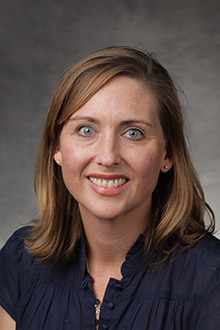
Emory physician-scientist Colleen Kelley has won the 2021 Award for Excellence in HIV research. Kelley has focused her work at the intersection of science and social justice.
ATLANTA – Emory physician-scientist Colleen Kelley was awarded the HIV Medicine Association’s 2021 Award for Excellence in HIV Research. The award was presented to Kelley during the Infectious Disease Society of America conference.
Kelley’s work focuses on the spread of HIV and sexually transmitted infections among sexual and gender minorities, as well as disparities in HIV prevention and intervention uptake. In announcing the award, the HIV Medicine Association said Kelley “has a deep understanding of laboratory-based research, clinical trials, and epidemiologic research and has been a tireless champion for underserved populations in both clinical care and research participation.”
We talked to Dr. Kelley about the award and the future of HIV.
Q: Dr. Kelley, congratulations on this award. What does it mean to you to win recognition like this from your peers?
It’s obviously very special to know that others appreciate your contributions to the field of HIV prevention.
Q: Did you always know you were destined to work in health care?
I first had an inkling about becoming a physician in high school, but research and academics was something I had never heard of. Once I was exposed to research in medical school at Emory, I was totally hooked on that possibility as a career path.
Q: What drew you to infectious diseases and, in particular, HIV?
I always say that I have a love/hate relationship with HIV. I love HIV science but hate the human impact. I was drawn to HIV to work at the intersection of fascinating, cutting edge science and social justice. I can’t think of a field where this intersection is more palpable than infectious diseases, and its truly my privilege to be an HIV doctor and researcher.
Q: You have focused much of your work on marginalized and/or underserved populations. Why?
I am passionate about social justice and equity. I realize how fortunate and privileged my situation in life is, and I am deeply committed to ensure everyone has access to health as a human right.
Q: Do you think we will we see an HIV “cure” or vaccine in your lifetime?
Yes, an HIV cure or a vaccine may not look the way we are expecting, but I do believe it is possible to reduce new HIV infections to rare events and significantly improve longevity and quality of life for those living with HIV.
Q: The Southeast remains a place where HIV infection rates are high. What is the most effective way to tackle this problem?
There are two requirements: political will to support health equity and resources to implement effective interventions. In order to do this, poverty, racism, homophobia, as well as equitable access to health care and education must all be addressed.
Q: As we look past COVID-19, what gives you hope for the future? What is the biggest challenge?
Looking back, the ability of the scientific community, the federal government and industry to come together and give the world several effective COVID-19 vaccines in one year’s time gives me great hope. This shows that our capabilities to tackle difficult problems are near limitless with political will, resources and the scientific community all on board. Now, the challenge is ensuring equitable access and uptake of these amazing scientific advances across the globe — we are not healthy until the planet is healthy.
Colleen Kelley, MD, MPH, is an associate professor of medicine at Emory School of Medicine, and associate professor of epidemiology at Rollins School of Public Health. She is an attending physician in the Infectious Diseases Program and Inpatient Consult Service at Grady Memorial Hospital, an affiliated scientist at the Yerkes National Primate Research Center at the Emory Vaccine Center, and an investigator and co-director for prevention sciences at the Emory Center for AIDS Research. She also serves as an investigator at the Emory/CDC Clinical Trials Unit, the Vaccine Treatment and Evaluation Unit, and the COVID-19 Prevention Trials Network.
Kelley has made significant contributions to the scientific community’s understanding of the rectal inflammatory milieu as an important mediator of HIV acquisition for men having sex with men. She has spearheaded innovative studies exploring the differences due to hormone exposure for transgender women who have sex with men. Additionally, she led numerous NIH network studies at Emory University and is currently the principal investigator of four simultaneous NIH Research Project Grants.
